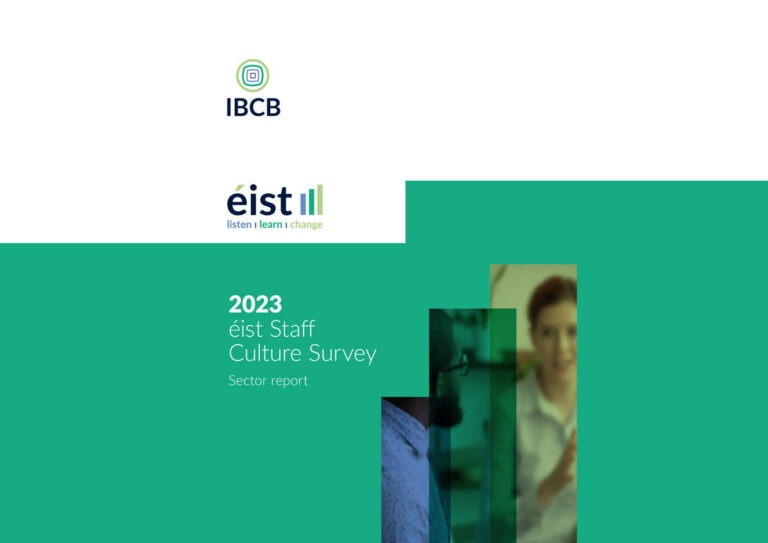IBCB and BPFI announce Guiding Principles for banks support of customers and staff through current account migration
6 May 2022: The Irish Banking Culture Board (IBCB) and Banking & Payments Federation Ireland (BPFI) today announced a set of Guiding Principles agreed to by their mutual member banks (AIB, BOI, KBC Bank Ireland, PTSB & Ulster Bank) for the management of the major changes in the Irish banking market.
The impending departure of Ulster Bank and KBC Bank Ireland and the resulting challenge that arises in relation to current accounts is an opportunity for the industry to demonstrate its commitment to further rebuilding trust in the sector. This can be done through clear and timely communications, allocation of appropriate resources as well as a commitment to managing the transition in a fair and transparent manner in recognition of the industry’s unique societal role and responsibilities.
While it is the responsibility of the individual banks and their industry body, BPFI, to implement and communicate the changes required, the IBCB will focus on ensuring that this major change is managed in a way that is consistent with the attributes of good culture and behaviour as set out in the IBCB’s overall approach to material industry change, published in September 2021.
The principles are motivated by the necessity to protect customers and staff throughout the process of change and centre on commitments to adequate resourcing, and on providing both with timely, clear and specific information and all necessary support. Commenting on the announcement of the Principles, CEO of the IBCB, Marion Kelly, said: “Customers impacted by the departure of Ulster Bank and KBC from the Irish market are understandably concerned about access to banking services going forward. While there are real challenges for the industry in managing this unprecedented market change it is also recognised that the manner in which it is done will have an impact on overall trust in the sector. “
Marion Kelly continued: “Since our establishment over three years ago, the IBCB which is composed of individuals from a wide range of societal and industry bodies, primarily representing the interests of customers, has been focussed on supporting, assessing and measuring behavioural and culture change in our five founding member banks. In the context of change in the sector, IBCB’s focus is on how the changes are implemented and whether it is done in alignment with the core elements of positive behaviour and culture – fairness, transparency, and accountability. Announcing these Guiding Principles with the banking industry’s representative body, the BPFI, is evidence that our member banks are committed to managing this significant change in the right way. We will be assessing adherence to these Principles going forward, including through our ongoing éist trust & sentiment surveys, which are core to the IBCB’s research-based work programme, and are published regularly.”
Speaking on the publication of the Principles, Brian Hayes, Chief Executive, BPFI stated: “As BPFI and its members banks continue to prepare for and manage the unprecedented movement of customers and their accounts in the coming months, we very much welcome the opportunity to develop these Guiding Principles with the IBCB and are fully committed to their provisions regarding resources, clear information for customers and supports for our own staff. This commitment is already borne out by the hundreds of additional dedicated staffing resources which are being put in place across each of the banks’ account opening and call centre teams. With the volumes of transitioning customers due to increase significantly in the coming months, BPFI and its members will continue to work with the IBCB along with a wide a range of key stakeholders to ensure we are adhering to these principles, as well as to identify and address the challenges of this unprecedented transition as they arise.”
For more information:
- For media queries relating to the IBCB please contact: Fiona Murphy, Edelman
T: +353 87 8194464 | E: Fiona.murphy@edelman.com
- For media queries relating to the BPFI please contact: Jillian Heffernan, Head of Communications
T: +353 87 9016880 E: jillian.heffernan@bpfi.ie
About the Guiding Principles:
Guiding Principles for Customer Support for Account Closure, Opening & Moving
The following Principles have been agreed to guide our mutual member banks’ engagement with, and support for, customers and staff throughout the period ahead:
- Adequate resources will be deployed to meet the demand for account closing, opening and moving accounts.
- Clear and specific information will be made available to customers about the options available for moving their banking services, and appropriate supports will be available to those customers requiring particular assistance:
- Information provided will be clear, with any technical terms explained fully, easily accessible and provided on a regular basis as relevant,
- Contact details for further information, including hours and means of accessibility will be communicated to customers,
- Requirements regarding accessing various banking products will be clearly communicated to the customer,
- The timeframe for withdrawal from the market by departing banks will be clearly outlined (noting that this may be subject to change and subject to commercial, regulatory, and legal considerations), underpinned by the objective of providing “certainty periods” to those impacted (i.e., when action will be required by the customer.).
- Clear direction and support will be provided to front line staff on the handling of customer applications and the opening of accounts, with no customers being refused access to banking services, subject to compliance with legal and regulatory obligations.
The successful management of this significant market change will also require other key sectoral actors to commit to playing their part in facilitating a smooth and effective transition for customers and member banks, and ongoing engagement between the banking industry and these parties is essential.
BPFI and IBCB members subject to these Principles include:
- AIB (Allied Irish Banks)
- Bank of Ireland
- KBC Bank Ireland
- PTSB
- Ulster Bank Ireland DAC
About the Irish Banking Culture Board:
The Irish Banking Culture Board is an independent industry initiative established and funded by the five retail banks in Ireland (Allied Irish Banks, Bank of Ireland, KBC Bank Ireland, PTSB & Ulster Bank) with the purpose of working with their member banks to build trustworthiness in order to assist the industry in regaining public trust. The IBCB’s goal is to act as a transformative influence on culture within the banking sector. The Board is independent with a non-banking majority, whose members are drawn from across Irish society. The role of the IBCB is to be an independent voice advocating for cultural change in the Irish banking industry. The IBCB will demand that participating banks improve culture, customer outcomes and competence. Rooted in the knowledge that a changed culture will change outcomes, the IBCB promotes ethical behaviour and advocates for humanity, decency, and respect in the banking sector. The IBCB will not act as a lobbying or representative organisation. It will not act as a regulatory body nor duplicate the work of individual banks, the BPFI or the regulator. For more information www.irishbankingcultureboard.ie
About Banking & Payments Federation Ireland
Banking & Payments Federation Ireland (BPFI) is the voice of banking and payments in Ireland. Representing over 100 domestic and international member institutions, BPFI mobilises the sector’s collective resources and insights to deliver value and benefit to members, enabling them to build competitive sustainable businesses which support customers, the economy and society.




